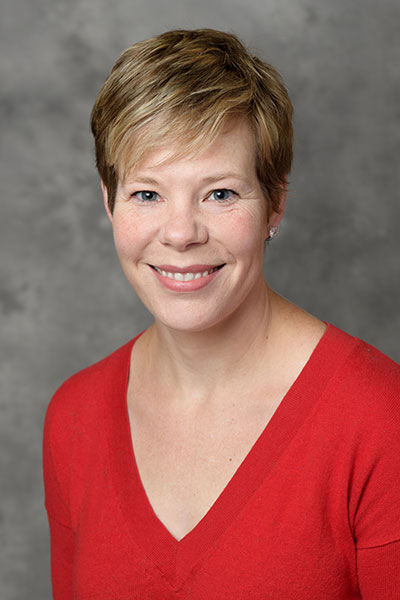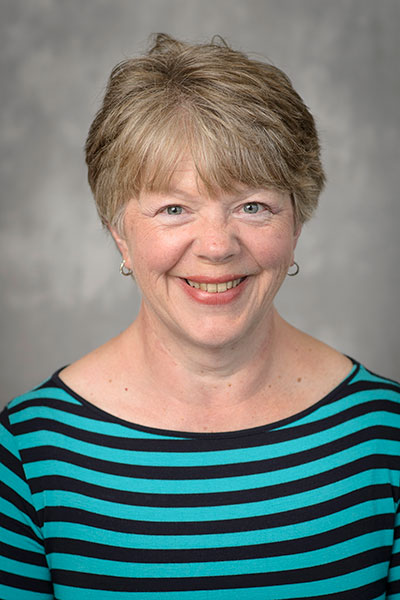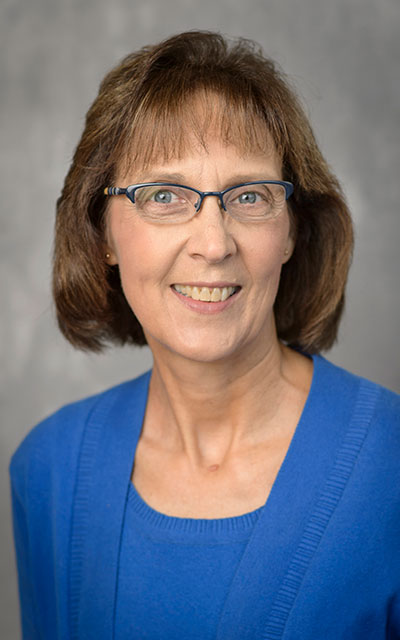Dietetics Learning Community serves students fresh opportunities
Written By: Rebecca Hoffa, rhoffa@purdue.edu

Rachel Clark, assistant clinical professor in Purdue University’s Department of Nutrition Science.(Photo provided)
Instructors Rachel Clark, Dinah Dalder and Donna Zoss want students in Purdue University’s Dietetics Learning Community to know a career in dietetics goes beyond encouraging hospital patients to eat their vegetables. The two-time award winning trio of Purdue Learning Communities’ Real-World Experience Award introduces the realm of career possibilities through a variety of events and activities.
Dalder, a clinical assistant professor in the Department of Nutrition Science and director of the Coordinated Program in Dietetics, said many students are driven to the dietetics field from their encounters with nutrition in their own lives. From there, the Dietetics Learning Community aims to educate students further on where a degree in dietetics can lead them.
“Maybe they were an athlete who changed their eating habits and found that their performance was much better in athletics, or maybe they had a grandparent who was sick with diabetes or cancer — a lot of times personal experience will bring a student into the field, but they don’t have a very broad understanding of what other opportunities and possibilities are available,” Dalder explained.

Dinah Dalder, clinical assistant professor and director of the Coordinated Program in Dietetics in Purdue University’s Department of Nutrition Science.(Photo provided)
The learning community is designed for first-year students and students new to the dietetics program to offer them a peek into the world of dietetics, both as dietetics students at Purdue and as registered dietitians (RD) in the field. The program also offers a way to connect with other students in the program as well as faculty and local dietitians in the community through social activities and networking.
“This year was the first time we did any of the events virtually, and it worked,” Dalder said. “It wasn’t what we planned on doing because a lot of times, we do social events and other fun activities, and we’ve taken field trips, so we adapted this year to just really try to do important activities virtually.”
During the 2020-21 school year, the learning community offered several virtual opportunities for students, such as meetings with local dietitians who work in food banks, schools, hospitals and other facilities. The students were also able to have discussions with upperclassmen in the Coordinated Program in Dietetics. Clark, who in addition to being an assistant clinical professor was also serving as interim director of the Didactic Program in Nutrition and Dietetics, also offered one-on-one meetings with students, which nearly all of them participated in.
For Clark, meeting with the students one-on-one was critical because most of them were feeling a lack of connection with the missing social events that the learning community is known for, such as a trip to Eataly in Chicago or a trip to the sports nutrition facilities on campus.
“I was feeling really bad for the freshmen,” Clark said. “I’m glad that they could be at Purdue, but I knew that it was still far from the usual great, exciting college experience. That’s how I came to the realization that I wanted to do this.”

Students from the Dietetics Learning Community gather for a group photo after touring Purdue’s sports nutrition facilities.(Photo provided)

Donna Zoss, senior lecturer and assistant director of the Didactic Program in Nutrition and Dietetics in Purdue University’s Department of Nutrition Science.(Photo Provided)
Even without a pandemic affecting social interaction, Zoss, a senior lecturer and assistant director of the Didactic Program in Nutrition and Dietetics, also noted that many first-year students and sophomores are in large classes where it can be difficult to connect with others who are in their major. In this way, the Dietetics Learning Community allows students to make friends within their major before their senior year when they participate in smaller discussion-based classes.
“They get to know each other relatively well during their senior year, but you need some of that cohesiveness before that, and I think this really helps if they get involved with the learning community,” Zoss explained.
Although the pandemic limited the learning community’s travel and ability to interact in-person as a group, Zoss said she appreciates that technology has offered new opportunities for the learning community to bring dietitians from across the country to the students through virtual interactions.
“I guess we did really give them ‘world experience’ because we brought dietitians to them that are out there in the work world,” Zoss said.
While COVID-19 is likely to stick around for a while, as more individuals get vaccinated, Clark is hopeful that the learning community will be back to participating in some of its in-person social activities in the fall, while following the health guidelines that are in place.
“Every year we come up with something new or different,” Clark said. “Students don’t need another super-enlightening classroom type of thing. They want another fun way to learn that’s not the norm and doesn’t feel pressurized. That’s kind of been our model.”
Discover more from News | College of Health and Human Sciences
Subscribe to get the latest posts sent to your email.